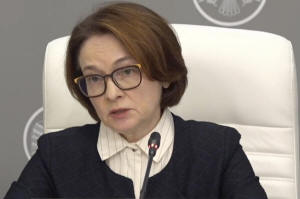|
The
bank’s inflation warnings in its policy statements underlined
the stresses in the Kremlin’s wartime economy.
The bank noted that inflation eased somewhat in July and August
but remains elevated at 8.2%. Still, it warned that “inflation
expectations have not changed considerably in recent months.”
“In general, they remain elevated,” the bank said. “This may
impede a sustainable slowdown in inflation.”
The contrast between a rate cut and continued inflation warnings
reflects serious frictions in the Russian economy.
The central bank is focused on containing prices. Yet the
finance ministry is pumping money into the economy in the form
of defense orders and military recruitment bonuses that have
fueled growth, wages and inflation over the course of Russia's 3
1/2 year war against Ukraine.
Year over year growth slowed to 1.1% in the second quarter from
1.4% in the first quarter and from 4.5% at the end of last year.
Compared to the quarter before, however, the second quarter
figure was a negative 0.6%, indicating the economy has lost even
more speed in recent months.
The deficit increased to 4.9 trillion rubles ($58 billion) in
the January-July period, up from 1.1 trillion rubles the year
before. Spending was 129% of the planned amount, according to
the Kyiv School of Economics, which tracks the Russian economy
and oil revenues. Meanwhile oil and gas revenues fell 19%
compared with the year earlier period, in part due to slack
global oil prices.
Despite sanctions that have deprived Russia of foreign
investment in some industries and the loss of most of its
natural gas sales to Europe, the economy has held up better than
many expected at the start of the war. Unemployment is at record
lows and household incomes are rising. Recruitment bonuses have
pumped cash into poorer regions. Oil shipments have remained
steady even as the price has fluctuated.
Meanwhile the government is able to finance its deficit by
selling ruble bonds to domestic banks, which are eager to buy
the bonds because they anticipate that interest rates will
continue to fall.
All contents © copyright 2025 Associated Press. All rights reserved

|
|




